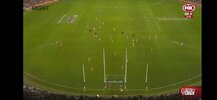fair. we were a good team for almost all of the 90s, and anecdotally, i'd say our close game record had to be crap.Except stats don't tend to show a pattern with this.
Good teams don't get stuck playing lots of close games.
It's an artefact of human thought where we think there's a pattern to it.
maybe it's more that good teams can turn a close game into a 2-3 goal win (which is no longer "close")






